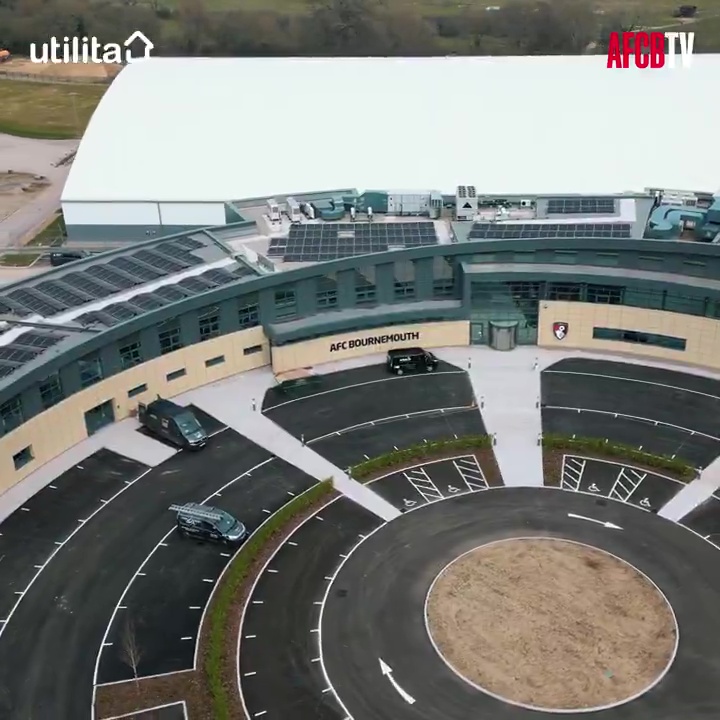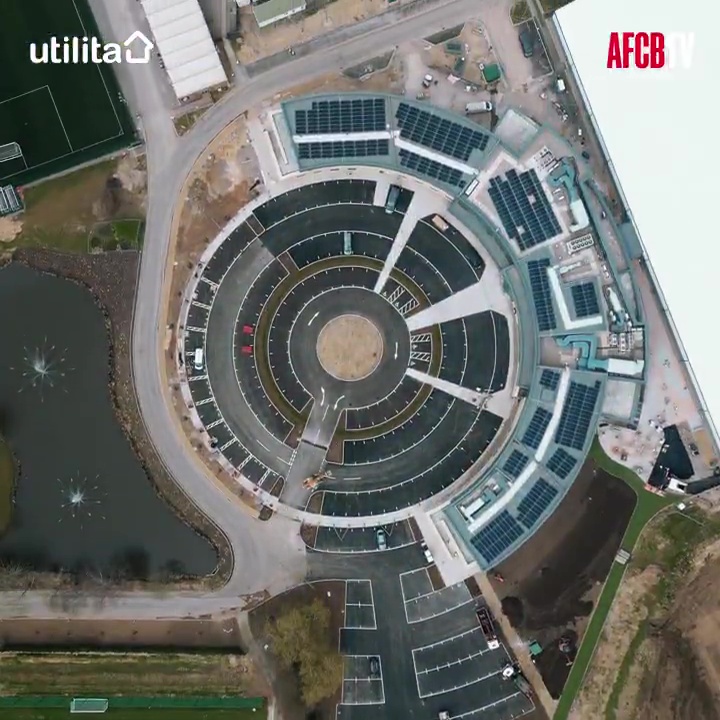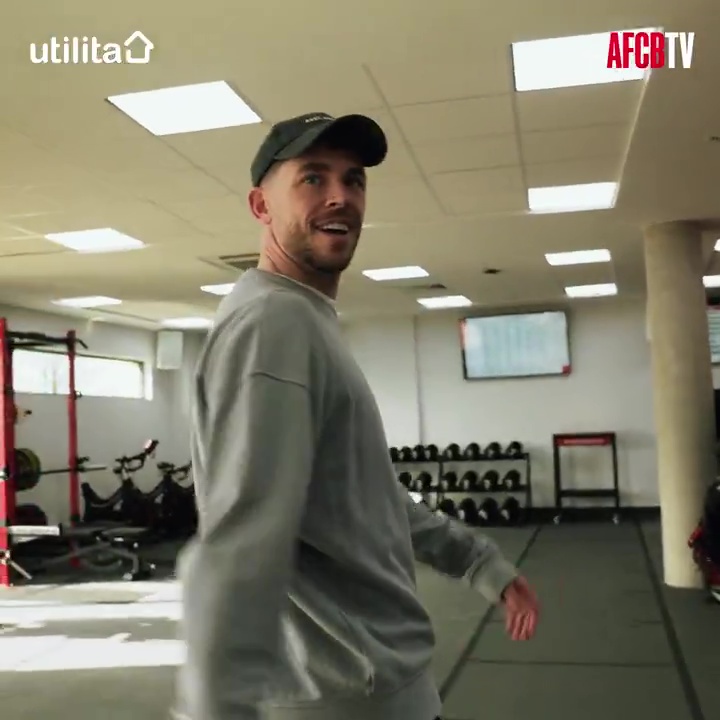
A Futuristic Base for Premier Talents
Bournemouth Football Club has taken a significant step forward by inaugurating their state-of-the-art Performance Centre. On the first day, players from the squad, including Ryan Christie and Justin Kluivert, expressed their excitement as they arrived at the new facility. The impressive complex, located in Canford Magna, Dorset, spans 57 acres and offers a range of modern amenities designed to enhance player performance and comfort.
Players Thrilled with the New Facilities
The new training ground has been met with enthusiasm from the team. Justin Kluivert, 25, shared his positive first impressions, describing the environment as "lovely." Meanwhile, Ryan Christie couldn't contain his excitement, exclaiming, "Look at this! Amazing!" These reactions highlight the club's commitment to providing top-tier resources for their athletes.
An Imposing Structure with Comprehensive Amenities
Aerial views of the Performance Centre reveal a striking semi-circle of buildings, giving the complex a distinctive and modern appearance. The design evokes a sense of sophistication, reminiscent of high-security facilities. Inside, the players will find spacious dressing rooms, a fully equipped gym, a well-appointed canteen, and comfortable lounges, all tailored to support their training and recovery needs.
Manager Andoni Iraola Sets the Tone
Upon returning from international commitments, Andoni Iraola, Bournemouth's 42-year-old manager, wasted no time in utilizing the new pitches. His leadership has been instrumental in maximizing the potential of the pristine training grounds, ensuring that the team benefits fully from the enhanced environment.

Ambitious Plans for Vitality Stadium
Owner Bill Foley has outlined a bold vision for Bournemouth's home ground, Vitality Stadium. Currently seating 11,307 spectators, the smallest stadium in the Premier League, Foley aims to expand its capacity in stages. The initial phase targets an increase to 16,000 seats, followed by further expansions to 20,000 and eventually 24,000. These upgrades will focus on improving hospitality services and creating a more welcoming atmosphere for fans.
Strategic Stadium Enhancements in the Pipeline
The Vitality Stadium, currently owned by Structadene, is set to undergo significant transformations once Foley secures full ownership. Plans include renovating the south stand to make it a permanent fixture with enhanced hospitality options. Additionally, the main stand will see improvements in hospitality spaces and access points, including the installation of high-speed elevators to streamline fan movement and reduce congestion.
Managerial Speculations Amid Ambitions
Amid these developments, Bournemouth faces potential changes at the managerial level. Andoni Iraola has attracted interest from Premier League giants Tottenham and possibly Real Madrid, should Carlo Ancelotti depart. Retaining Iraola could be pivotal for Bournemouth as they strive to stabilize and build on their recent progress.
A New Era for The Cherries
The newly unveiled training ground marks a transformative period for Bournemouth. The facility not only provides players with top-notch resources but also symbolizes the club's forward-thinking approach. With ambitious plans for Vitality Stadium and a focus on enhancing both player and fan experiences, Bournemouth is poised to make a significant impact in the Premier League.

Looking Ahead
As Bournemouth settles into their new Performance Centre, the club's future looks promising. The combination of advanced training facilities and strategic stadium expansions sets the stage for continued growth and success. Fans and players alike can look forward to a rejuvenated Bournemouth, ready to take on the challenges of top-flight football with renewed vigor and support.
Frequently Asked Questions
How important is a football player's diet and nutrition?
The nutrition of football players is essential to their performance and recovery. A healthy diet is important for energy and muscle repair. Dehydration will also affect your performance. The timing of meals and nutrition strategies may vary depending on the training and match schedules. It is beneficial to consult a sports nutritionist in order to create individualized dietary plans.
What role is played by a head coach in a football squad's success?
The coach is a key player in the success of a football squad. This role involves developing training programs, planning tactically, and managing players. In addition to creating training programs, a coach must also devise strategic game strategies and motivate players to give their best. The coach also makes crucial decisions on player selection and placement, and manages the dynamics of the team in order to maintain an environment that is positive and focused. Their leadership is often what guides teams through difficulties and propels them to success.
What is the rule of offside in football?
The offside rule in football is designed to prevent players from gaining an unfair edge. Offside is when a player's head, body or feet are in the opposite team's side of the field, closer to their opponent's goal than the ball, and also the next-to-last player (typically, the last player on the outfield) at the time the ball is passed to them. Offside is not a crime in and of itself. However, it can become a criminal offense if he or she actively interferes in play, gains an unfair advantage, or gets in the way of an opponent.
What is the best defensive strategy against a powerful offensive team?
Defending against a strong offensive team requires a disciplined and strategic approach. A disciplined marking system and an organized defensive line are key tactics. To limit the chances for scoring, force the attackers away from the center and towards the sidelines. It is also important to have good communication between the defenders, and make quick changes from offense to defense if possession is lost. The offensive team can use counter-attacking tactics to exploit any gaps created by the defensive team's commitment.
What strategies can I use to stay motivated and focused on improving my football skills?
Staying motivated and focused requires setting clear, achievable goals and tracking progress towards them. Reviewing performance during training sessions and matches on a regular basis can identify strengths that need to be developed and areas where improvement is needed. Joining a group of players or finding a training partner can help foster relationships that promote persistence. Visualizing success and keeping a good attitude can also help motivate. Incorporating variety in training routines to keep practices engaging, and allowing for sufficient rest and recovery are also important strategies to maintain motivation and focus for long-term development in football.
Statistics
- Youth players who participate in football education programs have a 35% higher chance of being scouted by professional clubs.
- Defensive units that practice coordinated drills together at least twice a week concede 18% fewer goals in match play.
- Goalkeepers who engage in specialized reaction-time training reduce their goals-conceded tally by an average of 25% over a season.
- Football players who follow a structured fitness regimen can see up to a 7% increase in their on-field speed and agility benchmarks.
- A consistent mental focus regimen, including visualization techniques, can enhance player concentration levels by up to 20% during matches.
External Links
How To
How to Improve your Physical Fitness for Football
For football success, you must develop a comprehensive fitness program. Incorporate both aerobic and anaerobic workouts into your training regimen to build stamina and speed. Sprints and hill runs will increase your explosive power through interval training. Strength training should focus on the core, legs, and upper body to enhance overall performance. To prevent injury and maintain agility, stretching and flexibility exercises are also essential. As important as exercise sessions are recovery and rest days, as well as proper nutrition.
Did you miss our previous article...
https://sportingexcitement.com/premier-league/sean-dyche-opens-up-about-everton-departure-and-david-moyes-transition
 CricketBoxingFormula 1GolfHorse RacingPremier LeagueTennisPrivacy PolicyTerms And Conditions
CricketBoxingFormula 1GolfHorse RacingPremier LeagueTennisPrivacy PolicyTerms And Conditions
